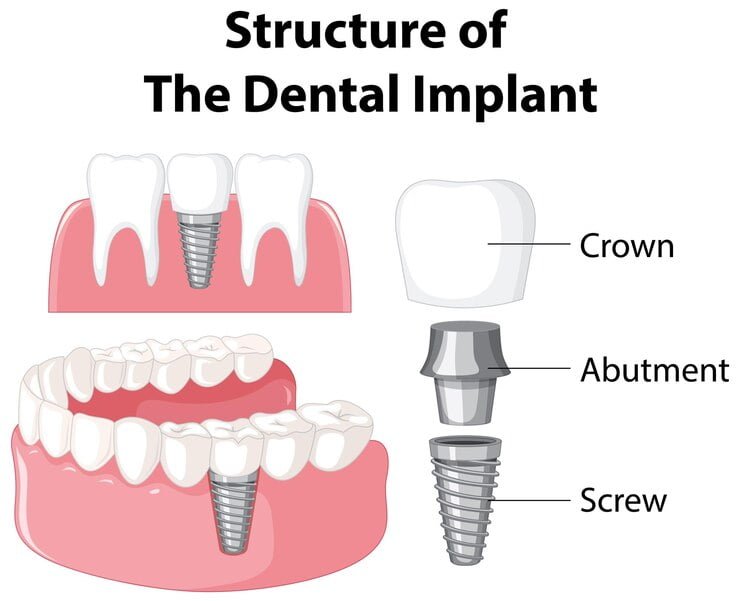
Mini-dental implant are a perfect solution to the problem of dentistry. They provide a minimally invasive affordable alternative to traditional dental implants. They are particularly helpful for patients who are missing teeth or have loose dentures. With the growing demand and advances in technology for dental care, MDIs have become a well-liked choice for dentists, dental patients and health professionals alike. This blog will discuss the details about mini implants for dental use, the advantages along with the process, and more.
What Are Mini Dental Implants?
Dental implants that are miniature less in size than the traditional implants. Although traditional implants typically measure 3.25 to 5 millimeters across, MDIs generally measure between 1.8 to 3 millimeters. Despite their smaller size they have the same function, providing an ideal foundation for dental bridges, crowns or dentures.
Components of Mini Dental Implants
Titanium Post Titanium Post:
The main component surgically implanted in the jawbone.
O-Ring:
An attachment built-in which connects with the prosthetic tooth.
Abutment:
The portion that extends over the gum line in order to provide support for dental implants.
Benefits of Mini Dental Implants
Minimally Invasive Procedure
One of the major benefits that comes with MDIs is their minimally-invasive nature. It requires fewer bones which makes it appropriate for patients suffering from the loss of bone.
Faster Recovery Time
Because of the less invasive process patients usually experience quicker recovery times. This results in less discomfort and an easier return to regular routine.
Cost-Effective
MDIs generally cost less than conventional dental implants, which means they are accessible to a greater number of patients.
Versatility
The mini implants are used for help stabilize dentures, substitute single teeth and assist bridges. They are versatile, making them an ideal feature for a variety of dental issues.
Immediate Results
In many instances, MDIs can be placed and reinstalled in just one visit, resulting in immediate outcome and functional.
The Procedure for Mini Dental Implants

Introductory Consultation
The first step towards getting implant-like minis are to have an initial consultation with a certified dentist. In this appointment the dentist will examine your dental health, make photographs, and talk about the options for treatment.
Treatment Strategy
Based on the assessment the dentist will then create an individual treatment plan. This will include the amount of implant required as well as the type of prosthetic that will be used as well as the general procedure.
Implant Placement
The actual placing of tiny dental implants are a easy procedure, and is often done within a single visit. This is a step-by-step procedure:
Anesthesia Local anesthesia:
The procedure is used to reduce pain in the area.
Insertion
These titanium screws are meticulously placed into the jawbone.
Attachment:
The O rings and abutments are attached to posts.
Prosthetic Placement:
Dental prosthetic (crown bridge, crown, or denture) is securely fixed.
Post-Procedure Care
Following treatment, people receive specific instructions for care to warrant an effective healing. This could include avoiding foods that are hard as well as maintaining a good oral hygiene, as well as taking prescription medications.
Who can benefit from mini dental implants?
Patients suffering from Bone Loss
MDIs are suitable to patients that have suffered from loss of bone and might have a hard time being appropriate contestants for conventional implants.
Denture Wearers
Implants for mini dental prostheses favor an ideal foundation for dentures, removing the discomfort and discomfort that are often caused by loose dentures.
Individuals Looking for a Quick Fix
For patients who want quick payoff, MDIs offer a faster and simpler option compared to conventional implants.
Elderly Patients
Due to the less-invasive process mini dental implants can be a good feature for older patients who might have health concerns.
Comparing Mini Dental Implants to Traditional Implants

Size and Design
Traditional Implants larger in size, they require more bone structure.
Mini Dental Implants are smaller and more narrow, appropriate for patients with less bone available.
Procedure Complexity
Traditional Implants: Usually require different appointments and more complicated surgical procedures.
Mini Dental Implants are usually done in one appointment with a minimally-invasive method.
Cost
Traditional implants are generally more costly because of the complex nature of the procedure as well as the materials employed.
Mini Dental Implants Affordable and available to a greater number of patients.
Healing Time
Traditional Implants are more durable in healing due to the nature of invasiveness that the process.
Mini dental implants: Speedier recovery time, allowing patients to be back to normal activities earlier.
Potential Risks and Complications
Infection
Like any surgical procedure there is a chance of an infection. The following post-surgical care guidelines can reduce the possibility.
Implant Failure
Although it is not common, there is the possibility of failure of implants. It can be caused by poor placement, an inadequate bone structure or oral hygiene.
Nerve Damage
In some instances the placement of dental implants that are small can cause serve injury. Making sure you choose a trained and skilled dentist could benefit lower the chance.
FAQs
How long do mini dental implants last?
With the proper care and maintenance Mini dental implants will last for a long time. Regular visits to the dentist and good oral hygiene are vital to long-term success.
Do mini-dental implants are covered under insurance?
The coverage for mini dental implants is dependent on the insurance company. It is important to inquire with your insurance provider to find out whether they’ll provide coverage for the procedure.
Mini dental implants can be used to make full-mouth restorations?
Mini dental implants can be utilized to complete mouth restorations. They prepare solid foundations for dentures, which makes them a great feature for patients requiring extensive dental surgery.
Conclusion
Mini dental implants are an excellent alternative to conventional dental implants, offering the least invasive and affordable solution to various dental issues. Their versatility, quick recovery time, and low cost makes them a popular feature for patients who require dental implants as well as dentists and even health professionals. If you’re struggling with unsteady dentures or missing teeth or searching for a quick and efficient dental solution mini dental implants might be the perfect solution.
If you’re thinking about mini dental implants, speak to a dentist who is qualified to talk about your options and decide whether they’re a good choice for you. If properly maintained and cared for implant implants made of mini-sized titanium are able to serve an ongoing and effective solution for improving your smile and overall dental health.